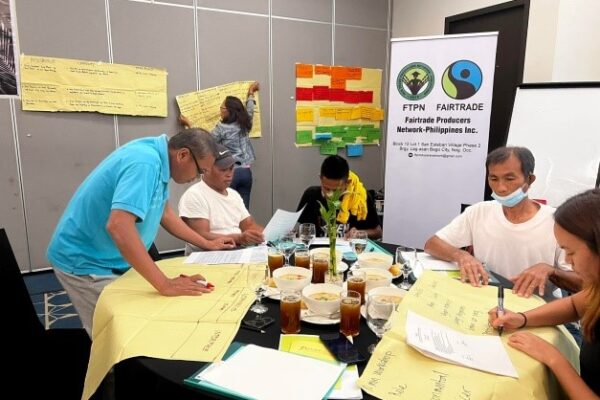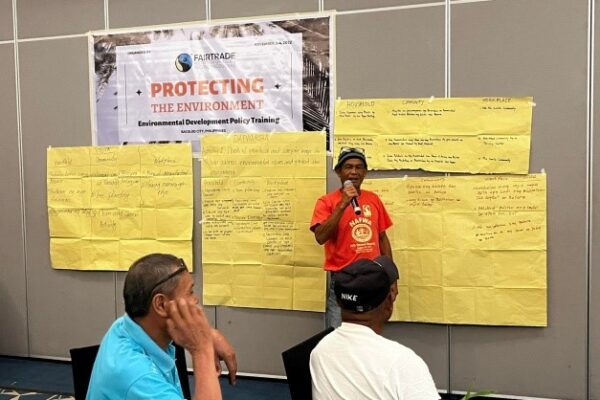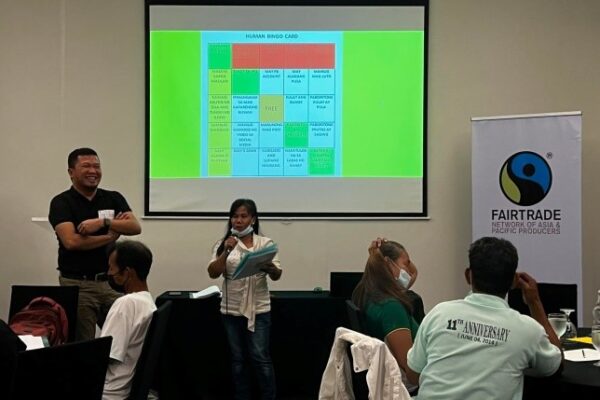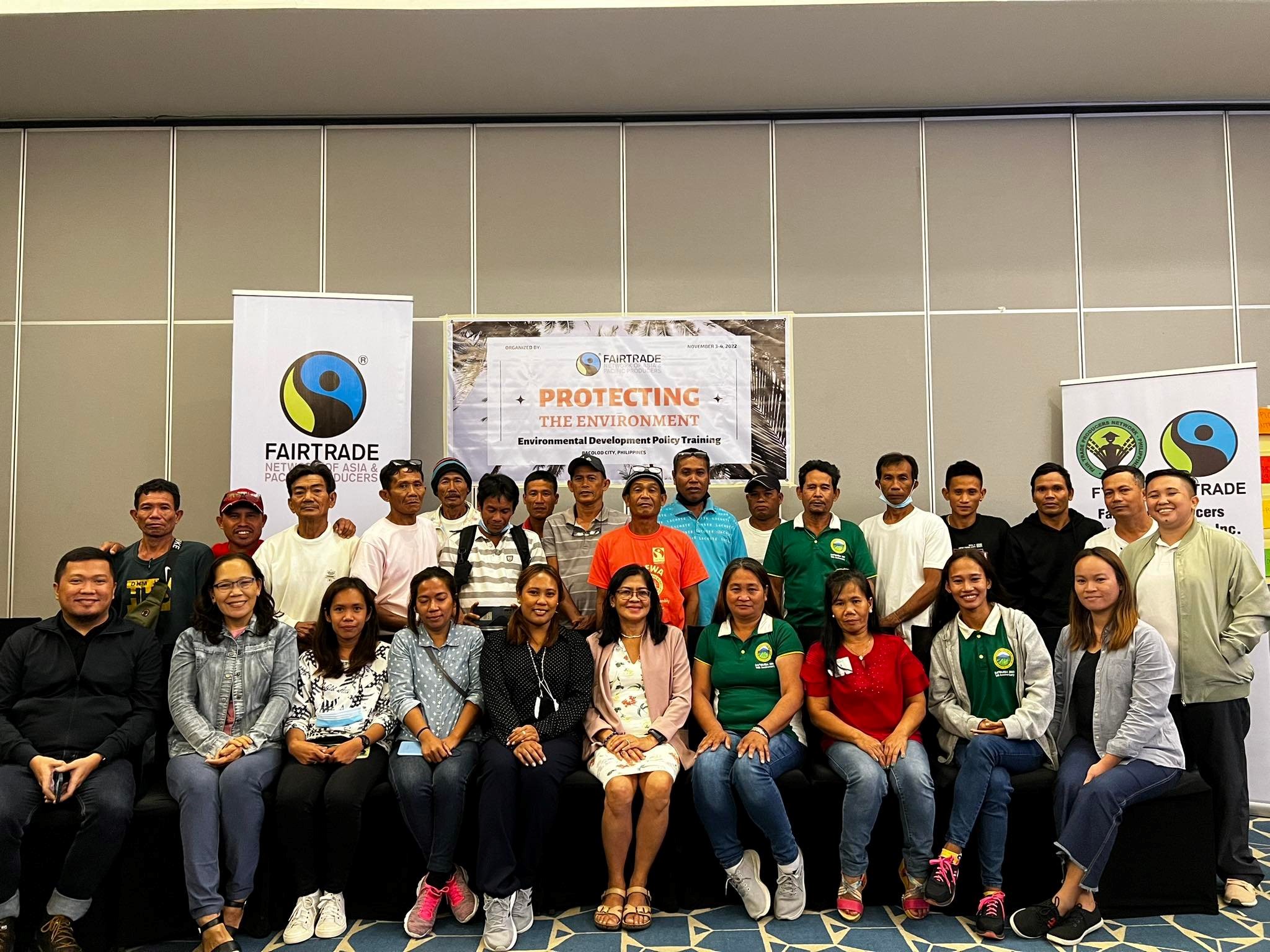
Environmental protection is ingrained in Fairtrade. Fairtrade-certified producer organization must at all times live by its principles and standards. To sell Fairtrade products, farmers have to improve soil and water quality, manage pests, avoid using harmful chemicals, manage waste, reduce their greenhouse gas emissions and protect biodiversity
While agriculture is vulnerable to climate change, if farmers learn how to grow in harmony with the local environment, it can reduce carbon emissions, increase carbon sinks, enhance biodiversity, and maintain natural habitats. As such Environmental Development Policy is a pre-requisite for all Fairtrade producer organisations. Strengthening the sustainability of local production systems by lowering dependencies on external inputs is an important step for them to adapt to climate change.
In the Negros, Philippines many forested areas have become targets for mining because it is rich in mineral resources and agricultural land conversion. Therefore, it is important for the Fairtrade Small Scale producers organisations in the country to have a stern stand on their environmental policy in case any destructive business activities take place in their communities and surrounding areas.
Building farmers’ skills and knowledge through technical support is also crucial. Through the support of Fairtrade Network of Asia and Pacific Networks (FT-NAPP) the farmers are provided with regular training and information to make them aware of environmental issues and the impact these have on their lives and crops.
On November 2022 a two-day ‘Environmental Development Policy Training’ was organized in Bacolod City, Philippines for 27 farmers comprising of environmental officers and committee members from 06 Fairtrade sugarcane producer organisations with an objective to review the Standards on Environmental Protection- a key element of Fairtrade’s commitment to sustainability. The farmers showcased their best practices and programs for protecting the future through the embodiment of organic farming practices and Fairtrade production practices. The producers are aware that they remain at the frontline of the environment and climate crisis and therefore, continuous increase of their resiliency is a matter of availability of resources and commitment to act proactively. In order to do this, producers believe that they should come together to create one voice: a voice that echoes globally through the Fairtrade system.

“Climate change is not new to us. We always have to face and experience the worst effects of severe weather conditions and every time it happens, we come up stronger. However, we cannot continue to live like this. We need to know how we can lessen the impact of climate change in our lives, in our livelihood, and in our children’s future. By understanding our weaknesses, we will be able to draw our strength as a network, as Fairtrade producers who are on the frontline of the calamity.”
Sandrico Cornelio, Chairperson, Fairtrade Phillippines Network
Representatives from the Provincial Environment Management Unit and the Department of Agriculture who were present at the workshop appreciated the community efforts in developing strong farmer organizations whose members advocate for the protection of the environment through their environmental development practices and advocacy. The farmers still need more education on relevant laws so they can aid the government in monitoring economic activities in their area that disregard environmental protection policies.
Josephine Maguad, Head of Environmental Management Bureau – Provincial Environment Management Unit, presented more strategies on climate change adaptation and mitigation that can help the farmers in crafting practical and simple ways in developing the environmental policy for their household, workplace, and community.
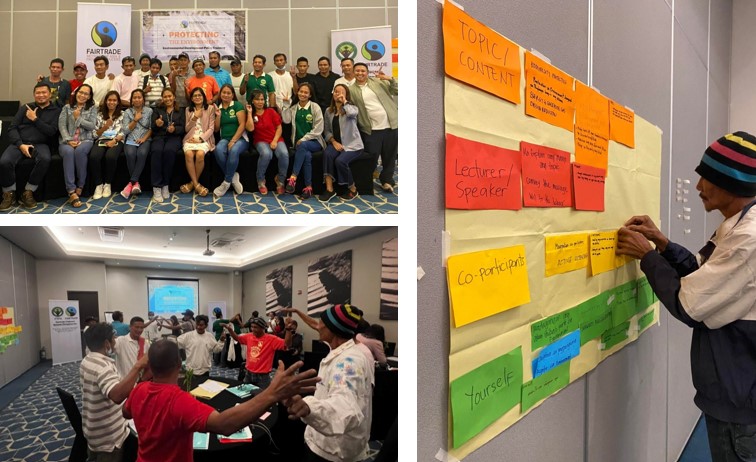 Natasha Erika Jane Siaron; Fairtrade Country Program Consultant explained the importance of documentation and having a committee and environmental officer in each SPO whose key focus should be the management of environmental development. As the main responsibility of the Environmental Officer would be to ensure effective implementation and adherence to environmental standards and guidelines applicable to the SPO production, to report the status of implementation of the policy, and to promote education on environmental protection, therefore they must choose a member who can influence decision-making at the organisational level.
Natasha Erika Jane Siaron; Fairtrade Country Program Consultant explained the importance of documentation and having a committee and environmental officer in each SPO whose key focus should be the management of environmental development. As the main responsibility of the Environmental Officer would be to ensure effective implementation and adherence to environmental standards and guidelines applicable to the SPO production, to report the status of implementation of the policy, and to promote education on environmental protection, therefore they must choose a member who can influence decision-making at the organisational level.
She also stressed the importance of considering potential threats while planning the strategy such as the scarcity of water even when the current conditions do not pose any problem related to the water supply. As the drastic effects of climate change are already felt in areas not previously prone to flooding or frequently visited by typhoons, a geo-mapping was considered necessary to assess potential risks in the area. The developments in the area such as the establishment of more physical infrastructure, and the cutting of trees could also influence changes in the environment, and therefore, observing the effects of this on-farm production would help farmers develop a disaster risk reduction and management strategy.
The farmers also had an opportunity to share all the challenges that currently impact their production and supply in a session on ‘Fairtrade Human Rights and Environmental Due Diligence’ virtually conducted by Tytti Nahi, Director, Centre of Excellence on Business and Human Rights at Fairtrade International. Some of the challenges discussed related to the destruction of farms and transport challenges resulting from the recent spate of typhoons, rising inflation leading to an increase in the costs of production, and reduced income which makes it difficult for farmers to make ends meet.
After the event, the participating organizations have agreed to come up with a common environmental development policy, terms of reference for environmental officers, and environmental development and climate crisis statement of commitment:
“We, as front liners in the work for fairness, inclusive sustainable growth, healthy, and just food systems, commit to supporting the Fairtrade movement in lending our collective voices as producers, in leading the promotion of production of safe and non-chemical products, in developing of a strategic partnership with other institutions, and in collective resource mobilization for program investment that will help protect the biodiversity of our ecosystem and reduce the effect of climate change to the people and the planet”.
Some of the important outcomes of the event were the review and update of the Environmental Development Policy, increased knowledge and understanding of Fairtrade Standard focus on sustainable production, environmental development, and validation of the risk mapping synthesis on Fairtrade HREDD approach


